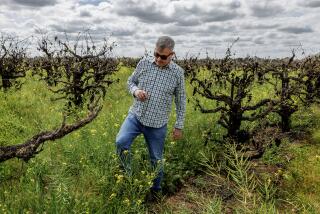50% Drop in Avocado Harvest Predicted : Bad weather: Higher prices for consumers and great losses for area growers are expected as a result of a heat wave and a winter freeze.
With harvest season fast approaching, avocado growers in Ventura County fear that a five-day heat wave last year and a winter freeze two months ago will mean about a 50% reduction in this year’s avocado harvest compared to 1988.
The shortage could be devastating for some growers in the county, which boasts an annual avocado harvest worth $55 million, the second largest in the state. Of the state’s 75,000 acres of avocado farms, those in San Diego County cover about 36,000 acres, followed by those in Ventura County, which take up about 16,000 acres, according to state and county agriculture officials.
Two years of bad weather have wreaked havoc on Ventura County avocado growers. Last year, they produced 23% fewer avocados than in 1988, according to the Ventura County Agricultural Commission. Agriculture officials predict that avocado production will drop about the same amount this year. In fact, because of bad weather, the dollar value of the crop dropped by $3 million to $55 million in 1989.
Although growers and county officials said it is still too early in the harvest to predict how the shortage will affect growers, they foresee higher prices for consumers at the checkout counter.
Grocers at local markets said the price of avocados has risen between 25 cents and 50 cents this year. Last year, small avocados were selling for about 99 cents each. On Monday, grocers reported the price had gone up to $1.49 at some markets. And industry officials predict retail prices will increase another 30% to 40% this year.
However, consumers did not seem put off by the prices. “It hasn’t stopped sales or anything,” said Winston Saavedra, a produce clerk at Lucky’s supermarket in Oxnard. “People still buy them.”
Some restaurant managers said avocado lovers already have noticed the effects of the shortage at their favorite eateries. Mike Omar, manager of Fiesta Restaurant in Ventura, said the high price of avocados forced him to stop selling guacamole two months ago.
“The prices are too high, and I can’t afford it,” he said. “I’ve never seen it this crazy.”
Omar said he used to buy about 80 avocados a week to make guacamole, which was a favorite among customers. Now there is a sign on the front door of the restaurant that reads: “Due to the shortage of avocados, we are temporarily out of guacamole.”
On the average, the state produced an annual harvest of about 400 million pounds over the last five years. However, because of bad weather, agriculture officials predict an annual harvest this year of about 200 million pounds.
Although local agriculture officials have no estimates on what the Ventura County harvest will be this year, they predicted that the county crop will suffer the same level of decline as the statewide harvest.
Grant Garland, regional manager of Calavo Growers of California, an agricultural sales cooperative that represents 750 growers in the county, said this year’s avocado harvest suffered a double-whammy, first from a five-day heat wave in March and April, 1989, and then from a winter freeze in February.
“It doesn’t do anybody any good. The consumer suffers, and the grower is hurt, too,” he said. “It’s a no-win situation.”
Garland said the avocado harvest in Ventura County begins in March and peaks in May. However, until the harvest is nearly over, growers cannot know how much financial damage the shortage will do, he said.
Most long-time avocado farmers probably will survive the bad harvest, but some new farmers may not, he said.
Ross Wileman, sales manager for Mission Produce, Inc., one of the largest shippers of avocados in Ventura County, said avocados are so popular that he expects consumers to pay the higher prices. “Avocados are kind of a rising star in the produce section,” Wileman said.
Don Reeder, a manager for Pro-Ag Land Management Inc., which manages about 1,300 acres of avocado farms in Moorpark, Santa Paula and Carpinteria, said the shortage already has been felt at his company.
“We are having a very, very, very short crop,” he said. “ . . . We have people back East who have forgotten what an avocado tastes like.”
Reeder said the shortage has forced his company to cut back on farm-improvement projects, such as weeding and cleaning ditches. He said the company also has put off filling vacant positions.
More to Read
Sign up for Essential California
The most important California stories and recommendations in your inbox every morning.
You may occasionally receive promotional content from the Los Angeles Times.











